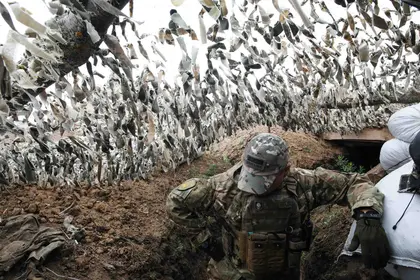Ukraine’s parliament adopted the Donbas reintegration law on Jan. 18. A total of 280 lawmakers voted for the controversial law No. 7163, with only members of the Opposition Bloc faction and several independent lawmakers voting against it.
Parliament debated the law for three days, voting on 675 amendments, of which only one was eventually approved – a measure giving Ukrainian citizens the right to sue Russia for damaging their property, without the claimant having to pay court fees.
The main features of the law include its declarations that Russia is an aggressor state, that parts of the Donbas are illegally occupied by Russian-controlled regular and irregular troops, and that the occupied areas are administered by self-proclaimed Russian occupation authorities. Also, it states that Russia is completely responsible for ensuring the occupied civilian population’s human rights and ensuring there are appropriate living standards for those living in the territories the Kremlin occupies.
The document allows the movement of civilians and goods via the currently existing system of entry checkpoints installed at several locations along the contact line.
Furthermore, the new bill significantly alters the status of Ukraine’s military in the war-torn eastern region, providing the legal basis for the presence of Ukraine’s armed forces along the Donbas front line without the declaration of martial law. Strategic command over all combat units and other formations will be assigned to Ukraine’s Armed Forces Joint Operative Headquarters, the head of which is to be nominated by the army’s Chief of General Staff and approved by the president.
The army’s top command is formally put in charge of all military and law enforcement activities in the region, thus formally ending the so-called “anti-terror operation” run by the SBU security service in the Donbas since April 2014.
However, the new law fails to overtly call the hostilities in the Donbas a war against Russia. Instead, the document repeatedly refers to “taking measures to ensure national security and defense, and repulsing and deterring the armed aggression of the Russian Federation in Donetsk and Luhansk oblasts.”
In addition, the law in its enacting clause refers to an April 2014 act that declares the Crimea to have been occupied since Feb. 20, 2014.
Submitted to the Rada by President Petro Poroshenko, law No. 7163 also expands his powers. He will be able to determine the borders of the occupied territories, set the exact terms of military operations, and define the boundaries of a “safe zone” adjacent to the area of military operations.
The law states that Ukraine will recognize only two documents issued in the occupied territory – birth and death certificates.
And in a move that will anger the Kremlin, after a fierce debate in parliament all references to the Minsk agreements as the basic framework for achieving a peace in the region were removed from the final wording of the bill.
You can also highlight the text and press Ctrl + Enter




